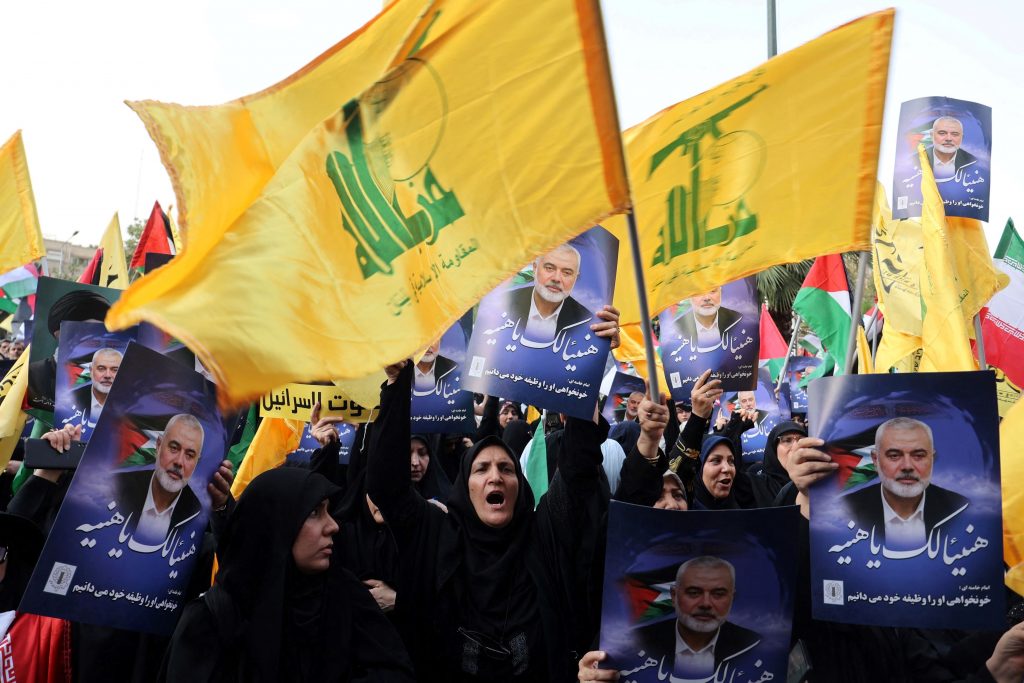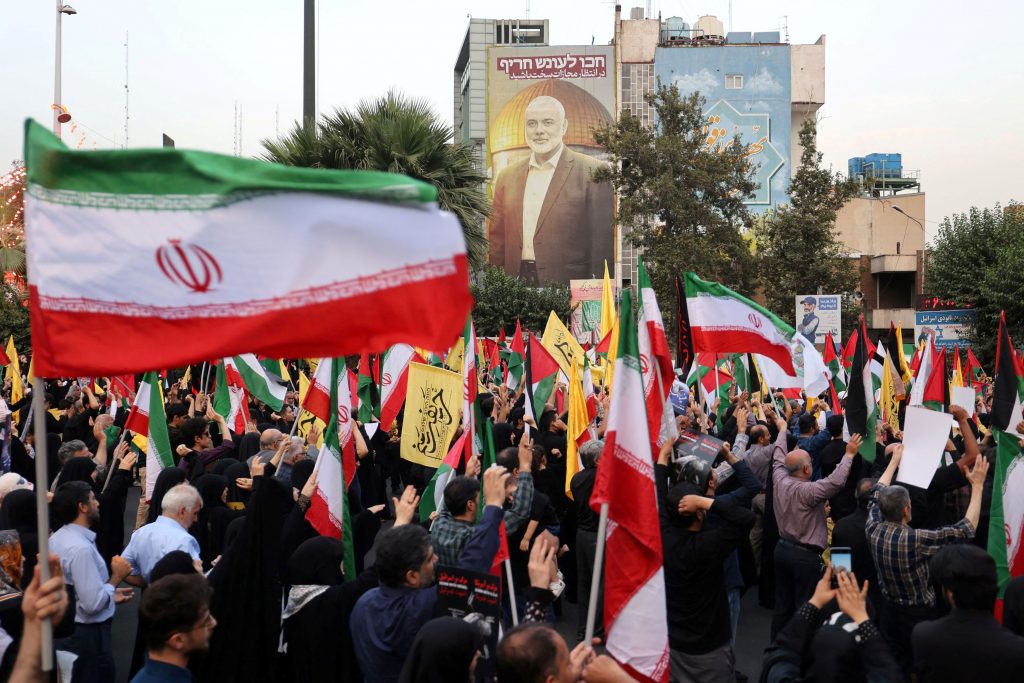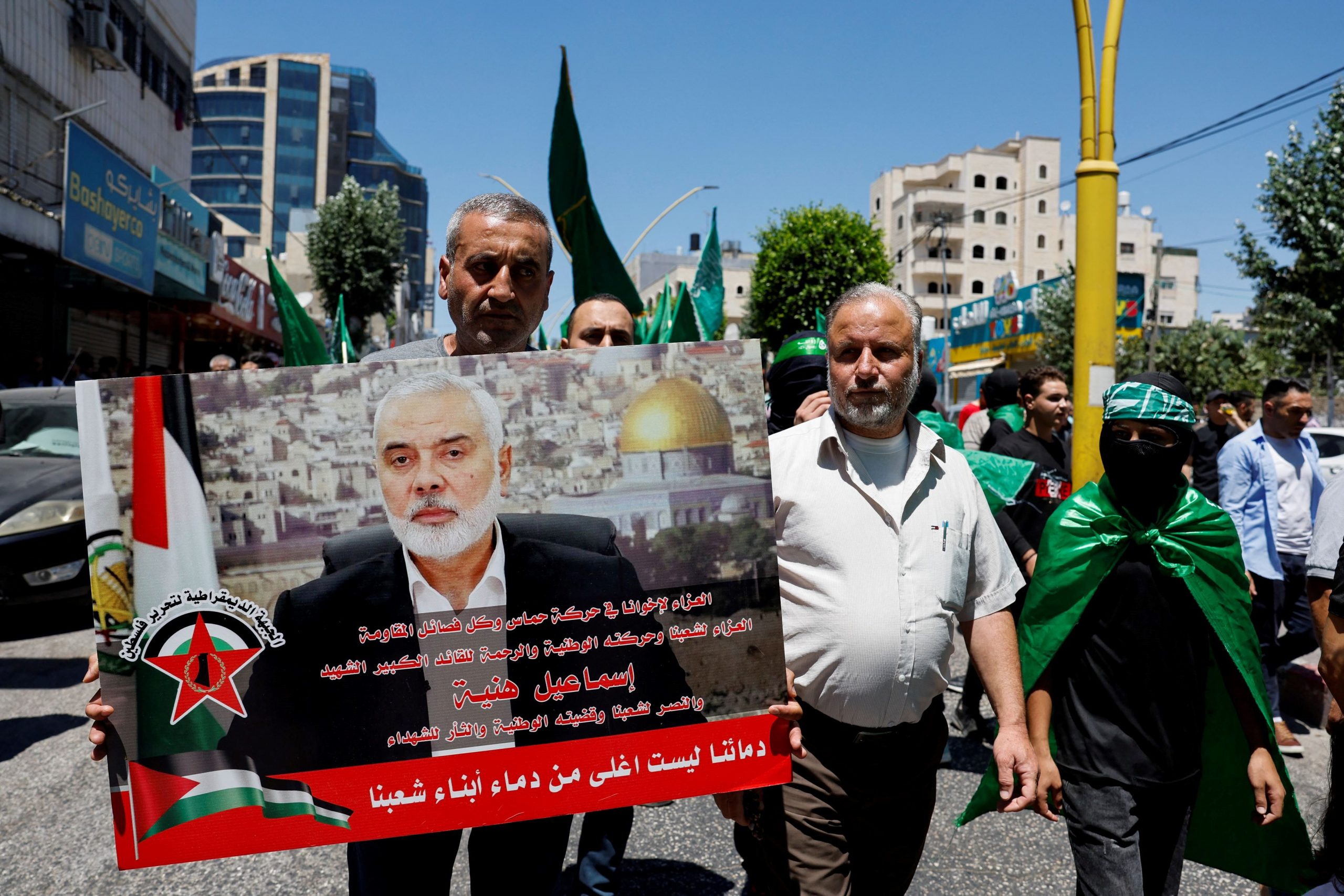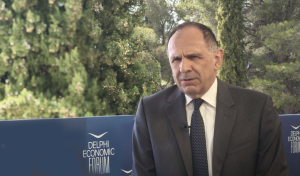In a divided Hamas, political leader Ismail Haniyeh was the strongest voice advocating for a cease-fire, clashing at times with other Hamas officials in heated discussions since the war in Gaza began.
A targeted strike in Tehran killed Haniyeh after he attended the Tuesday inauguration of Iran’s new president—an attack that could give Hamas’s hard-liners more sway and further complicate cease-fire discussions.
Hamas and Iran confirmed the death of Haniyeh, saying the leader had been killed by Israel, without offering details about how the strike was carried out. Israel hasn’t commented on the killing. Haniyeh is the highest-ranking Hamas political official to be killed since the group’s Oct. 7 attack in southern Israel.
The strike was one of two outside of Gaza targeting Hamas and Hezbollah officials after a blast on Saturday killed a dozen young people at a soccer field in the Israel-controlled Golan Heights. The announcement of Haniyeh’s death came hours after Israel said it killed a senior Hezbollah leader in Beirut, a strike that already risked further expanding the war in Gaza beyond the strip to the wider Middle East.
The killing of Haniyeh would be viewed as a major win for Israeli Prime Minister Benjamin Netanyahu, who has vowed to take out Hamas leaders for launching the Oct. 7 attacks, which Israel says killed 1,200 people and saw 250 taken hostage.
Iran, the Middle East’s Shiite power, backs both Hamas and Hezbollah, and Haniyeh’s killing on Iranian soil is likely to heighten regional tensions just as the U.S. is pushing Israel and Hamas to agree on a cease-fire in Gaza. Iran said it was investigating the details of the strike.
Iranian President Masoud Pezeshkian said Tehran will defend its territorial integrity and make “terrorist occupiers regret their cowardly action.”
In a televised address Wednesday, Netanyahu said challenging days were ahead and vowed to respond strongly to any further attacks on Israel from Iran, Hamas, Hezbollah or Houthi militants in Yemen.
“We are prepared for any scenario and will stand united against any threat. Israel will exact a very heavy price for any aggression from any arena,” Netanyahu said.
Haniyeh, as Hamas’s overall political leader, was part of a complex and sometimes secretive Hamas leadership structure that includes a military wing and a political arm.
Throughout the war in Gaza, Hamas’s leader in the strip, Yahya Sinwar, has been viewed as the key decision maker, as he has been closest to the U.S.-designated terrorist group’s military wing on the ground. But Haniyeh was also seen as an important figure in Hamas’s consensus-driven leadership, and his death is likely to complicate delicate cease-fire talks mediated by Arab nations.

People hold posters of Palestinian group Hamas’ leader Ismail Haniyeh, during an anti-Israel gathering following the killing of him, amid the ongoing conflict between Israel and Hamas, in Tehran, Iran July 31, 2024. Majid Asgaripour/WANA (West Asia News Agency) via REUTERS
“I see the chances of an agreement being very, very small,” said Gershon Baskin, a former hostage negotiator between Israel and Hamas who is now Middle East director of the International Communities Organization, a group that advocates diplomacy.
The political and military wings of Hamas have at times been divided. Haniyeh was open to demilitarizing, espousing more moderate views and pressuring Sinwar and Hamas’s military wing to acquiesce to a cease-fire deal in Gaza. More than 39,000 people have been killed in the strip since Oct. 7, mostly civilians, according to Palestinian health authorities, who don’t say how many were combatants.
“There is a risk that the removal of Haniyeh tips Hamas into more hard-line positions and makes striking a cease-fire deal even more difficult, as the movement has lost an important moderating voice,” said Hugh Lovatt, a senior policy fellow with the Middle East and North Africa Program at the European Council on Foreign Relations, a think tank.
Haniyeh was close to the spiritual founder of Hamas, Sheikh Ahmed Yassin, whom Israel killed in 2004. He rose through the ranks of the organization, first becoming leader in Gaza, before taking on overall leadership of the group’s political wing in 2017.
Haniyeh, who was physically larger in stature, was in charge of carrying Yassin, who relied on a wheelchair, up stairs and into meetings, said Nasser Alkidwa, a former Palestinian Authority official who had a relationship with Haniyeh.
“That made him indispensable,” Alkidwa said. “They became close, and that was his entry point into the upper ranks of the organization.”
Haniyeh became prime minister of the Palestinian Authority in 2006, following Palestinian legislative elections. He was pushed out by U.S.-backed Mahmoud Abbas, the Palestinian Authority president and head of the Fatah political party, leading to a deepened political split between the rival factions. Hamas then took over Gaza in 2007. The parties under Abbas and Haniyeh have remained unreconciled, despite several pushes to end the divide in which Haniyeh played a role. Senior Fatah officials on Wednesday condemned the killing of Haniyeh.
Born in Shati refugee camp in Gaza in 1962, Haniyeh spent time in Israeli detainment in the 1980s and 1990s, before being deported to Lebanon in 1992 alongside hundreds of other Palestinian political figures and activists. He was allowed to return to Gaza shortly after, amid the signing of the Palestinian-Israeli Oslo Accords. He survived several life-threatening attacks in Gaza, including an Israeli airstrike in 2003 and Palestinian gunfire in 2006.
As a senior Hamas official, he played an important regional diplomatic role, spending extended periods in Turkey and Egypt. He left Gaza in 2019 for Qatar, where he ran Hamas’s political affairs in exile.

People attend an anti-Israel gathering following the killing of Palestinian group Hamas’ leader Ismail Haniyeh, amid the ongoing conflict between Israel and Hamas, in Tehran, Iran July 31, 2024. Majid Asgaripour/WANA (West Asia News Agency) via REUTERS
Haniyeh was in Turkey at the time of the Oct. 7 attacks, where footage shows him watching the day’s events unfold on television. Hamas political leaders, including Haniyeh, knew the group’s military wing was planning an attack on Israel but were kept in the dark by Sinwar regarding the scale and timing, according to Arab mediators between Hamas and Israel.
Haniyeh found himself in a delicate position in his political role: Distancing himself from the attack while also attempting to portray to the public a unified Hamas.
Haniyeh is now one of a series of Hamas military and political officials who have been killed or are believed to have died since the start of the war.
The Israeli military earlier in July launched a strike in Gaza on the group’s most senior military commander, Mohammed Deif, and Israel has said there is reason to believe the strike achieved its aim of killing Deif. Palestinian officials say dozens of civilians were killed in Israel’s attempt to kill Deif. The Israeli military hasn’t so far confirmed his death, and Hamas has said Deif wasn’t killed. Israel killed Deif’s deputy in a strike earlier this year.
Haniyeh isn’t the first member of Hamas’s political leadership to be targeted. Israel killed Haniyeh’s deputy, Saleh al-Arouri, in a targeted strike in Beirut in January. Israel in April killed three of Haniyeh’s adult sons with airstrikes on the first day of the Muslim holiday of Eid al-Fitr, saying they were members of Hamas’s military wing. Hamas said seven people died in the strike, including four of Haniyeh’s grandchildren.
“The occupation believes that by targeting the sons of leaders, it will break the resolve of our people. We say to the occupation that this blood will only make us more steadfast in our principles and adherence to our land,” Haniyeh said in an interview with Al Jazeera on the day his relatives were killed.
In all, there are roughly 15 people at any one time in the senior political leadership, which determines the direction of Hamas via consensus, according to the European Council on Foreign Relations. Israel has vowed to hunt down Sinwar in Gaza, and he now marks the biggest target remaining among the leadership of Hamas.
“Netanyahu’s victory picture is when they do to Sinwar what they did to Haniyeh,” said Baskin, the former Israel-Hamas hostage negotiator.
In an open-ended question, 14% of Palestinians polled said Haniyeh would have been their preferred presidential candidate in an election in the West Bank and Gaza, according to a survey published in June by the West Bank-based Palestinian Center for Policy and Survey Research. Haniyeh had the second-highest level of support behind imprisoned political figure Marwan Barghouti.
Hamas officials likely to succeed Haniyeh, at least temporarily, include senior Hamas official Khaled Meshaal at the top of the list; Khalil al-Hayya, a more hard-line member of the Politburo; and Moussa Abu Marzouk, viewed as a more moderate figure who has clashed with Sinwar, according to analysts and Arab officials.
“Haniyeh was able to confront Sinwar because he is Gazan. That is probably the weak point of Meshaal, who was born in the West Bank,” said Alkidwa, the former Palestinian Authority official.
Aresu Eqbali and Benoit Faucon contributed to this article.



